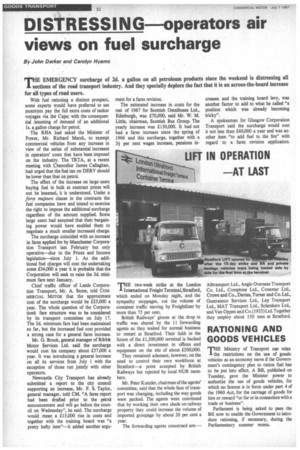DISTRESSING—operators air
Page 34

If you've noticed an error in this article please click here to report it so we can fix it.
views on fuel surcharge
BY John Darker and Carolyn Hyams With fuel rationing a distinct prospect, some experts would have preferred to see motorists pay the full extra costs of tanker voyages via the Cape; with the consequential lessening of demand of an additional is. a gallon charge for petrol.
The RHA had asked the Minister of Power, Mr. Richard Marsh, to exempt commercial vehicles from any increase in view of the series of substantial increases in operators' costs that have been imposed on the industry. The TRTA, at a recent meeting with Chancellor James Callaghan, had urged that the fuel tax on DERV should be lower than that on petrol.
The effect of the increase on large users buying fuel in bulk at contract prices will not be lessened, it is understood. Under a force majeure clause in the contracts the fuel companies have and intend to exercise the right to impose the additional surcharge regardless of the amount supplied. Some large users had assumed that their bargaining power would have enabled them to negotiate a much smaller increased charge.
The surcharge coincided with an increase in fares applied for by Manchester Corporation Transport last February but only operative—due to the Prices and Income legislation—since July 1. As the additional fuel charges will cost the undertaking some £34,000 a year it is probable that the Corporation will seek to raise the 3d. minimum fare next January.
Chief traffic officer of Leeds Corporation Transport, Mr. A. Stone, told COMMERCIAL MOTOR that the approximate cost of the surcharge would be £25,000 a year. The whole question of the Corporation§ fare structure was to be considered by its transport committee on July 17. The 2d. minimum fare had been maintained so far, but the increased fuel cost provided a strong case for a general fares increase.
Mr. G. Brook, general manager of Ribble Motor Services Ltd. said the surcharge would cost his company about £37,000 a year. It was introducing a general increase on all its services from July 1 with the exception of those run jointly with other operators.
Newcastle City Transport has already submitted a report to the city council supporting an increase, Mr. F. S. Taylor, general manager, told CM. "A fares report had been drafted prior to the petrol announcement and will go before the council on Wednesday", he said. The surcharge would mean a £15,000 rise in costs and together with the training board was "a pretty hefty item"—it added another argu ment for a fares revision.
The estimated increase in costs for the rest of 1967 for Scottish Omnibuses Ltd., Edinburgh, was £70,000, said Mr. W. M. Little, chairman, Scottish Bus Group. The yearly increase was £130,000. It had not had a fares increase since the spring of 1966 and this surcharge, together with a 34 per cent wages increase, pensions in
'THE two-week strike at the London
International Freight Terminal, Stratford, which ended on Monday night, and the sympathy stoppages, cut the volume of container traffic moving by Freightliner by more than 75 per cent.
British Railways' gloom at the drop in traffic was shared by the 11 forwarding agents as they waited for normal business to restart at Stratford. Their faith in the future of the £1,500,000 terminal is backed with a direct investment in offices and equipment on the site of about £200,000.
They remained adamant, however, on the need to control their own workforce at Stratford—a point accepted by British Railways but rejected by local NUR members.
Mr. Peter Kunzler, chairman of the agents' committee, said that the whole face of transport was changing, including the way goods were packed. The agents were convinced that by working their own sheds on railway property they could increase the volume of imported groupage by about 20 per cent a year.
The forwarding agents concerned are: creases and the training board levy, was another factor to add to what he called "a position which was already becoming tricky".
A spokesman for Glasgow Corporation Transport said the surcharge would cost it not less than £40,000 a year and was another item "to add fuel to the fire" with regard to a fares revision application.
Alltransport Ltd., Anglo Overseas Transport Co. Ltd., Comptons Ltd., Conemar Ltd., Crowe and Co., Davies, Turner and Co. Ltd., Gentransco Services Ltd., Lep Transport Ltd., MAT Transport Ltd., Schenkers Ltd., and Van Oppen and Co. (1935)LtcL Together they employ about 150 men at Stratford.
RATIONING AND GOODS VEHICLES
E Ministry of Transport can relax
the restrictions on the use of goods vehicles as an economy move if the Government's contingency plan to ration fuel has to be put into effect. A Bill, published on Tuesday, gave the Minister power to authorize the use of goods vehicles, for which no licence is in force under part 4 of the 1960 Act, for the carriage of goods for hire or reward "or for or in connection with a trade or business".
Parliament is being asked to pass the Bill now to enable the Government to introduce rationing, if necessary, during the Parliamentary summer recess.




































































































































